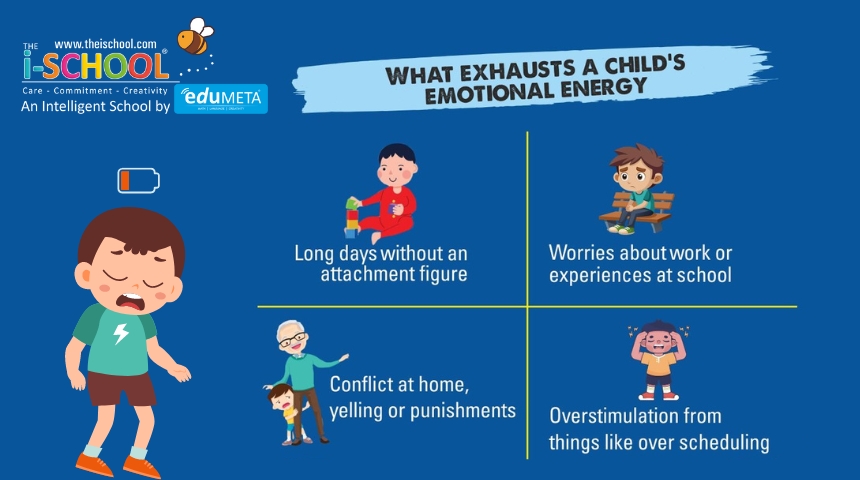What Exhausts a Child’s Emotional Energy

Children are naturally energetic and resilient, but their emotional energy can become depleted due to various factors. Understanding what can exhaust a child’s emotional energy is crucial for parents, caregivers, and educators to provide the right support and create a balanced environment. Here are some common factors that can lead to emotional exhaustion in children and ways to address them.
1. Over-Scheduling and Stress
Children who are over-scheduled with activities, including school, sports, extracurriculars, and social commitments, can experience emotional fatigue. The constant pressure to perform and meet expectations can be overwhelming. It’s important to balance structured activities with free time and ensure children have opportunities to relax and unwind.
Solution: Create a balanced schedule that allows for downtime and ensures children have time to rest and engage in unstructured play. Prioritize their well-being over a packed agenda.
2. High Expectations and Pressure
Excessive pressure to excel academically, athletically, or socially can drain a child’s emotional energy. When children feel they must constantly meet high expectations, it can lead to stress, anxiety, and burnout.
Solution: Encourage a growth mindset and emphasize effort and improvement over perfection. Provide reassurance and support, and celebrate their accomplishments and progress rather than focusing solely on outcomes.
3. Conflicts and Relationship Issues
Struggles with peers, family conflicts, or relationship issues can significantly impact a child’s emotional well-being. Social dynamics and family tensions can create feelings of insecurity, sadness, or frustration.
Solution: Foster open communication and provide a supportive environment where children feel comfortable expressing their feelings. Offer guidance on resolving conflicts and encourage positive relationship-building skills.
4. Major Life Changes
Significant transitions, such as moving to a new home, changing schools, or experiencing a family separation, can be emotionally taxing for children. Adjusting to new situations requires time and can be a source of emotional strain.
Solution: Offer reassurance and support during major life changes. Maintain routines where possible, and provide opportunities for children to express their feelings and adjust at their own pace.
5. Lack of Sleep
Inadequate sleep can negatively affect a child’s mood and emotional resilience. Sleep deprivation can lead to irritability, difficulty concentrating, and increased emotional sensitivity.
Solution: Establish a consistent and calming bedtime routine. Ensure children get the recommended amount of sleep for their age and create a restful sleep environment.
6. Overexposure to Media and Technology
Excessive screen time and exposure to media can lead to emotional fatigue and stress. Negative content, overstimulation, or social comparison can impact a child’s emotional health.
Solution: Set limits on screen time and encourage breaks from technology. Promote engaging in physical activities, hobbies, and face-to-face interactions to balance media use.
7. Unresolved Trauma or Emotional Issues
Unresolved trauma or ongoing emotional issues can deplete a child’s emotional energy. Experiences such as bullying, loss, or abuse can have lasting effects on emotional well-being.
Solution: Seek professional support if needed. Provide a safe and nurturing environment where children feel supported and understood. Professional counseling or therapy may be necessary for addressing deeper emotional issues.
8. Unstructured or Chaotic Environments
Living in a chaotic or unstructured environment can create stress and confusion for children. A lack of routine and stability can affect their emotional well-being and sense of security.
Solution: Establish consistent routines and provide a structured environment that offers stability and predictability. A calm and organized space helps children feel secure and supported.
9. Overexertion in Schoolwork
Heavy academic workloads or challenging assignments can overwhelm children, leading to emotional exhaustion. The pressure to perform well academically can cause stress and anxiety.
Solution: Support your child with managing their schoolwork and provide a conducive study environment. Encourage regular breaks and healthy study habits to prevent burnout.
10. Inadequate Emotional Support
A lack of emotional support and understanding from caregivers or peers can leave children feeling isolated and emotionally drained. Feeling unsupported can lead to emotional fatigue and affect overall well-being.
Solution: Provide consistent emotional support and be an active listener. Validate their feelings and offer guidance and reassurance to help them navigate their emotions.
Conclusion
Recognizing and addressing the factors that contribute to emotional exhaustion in children is essential for their well-being and development. By creating a balanced, supportive, and nurturing environment, you can help your child manage their emotional energy and build resilience. Prioritizing their emotional needs and ensuring they have opportunities for relaxation, support, and healthy interactions will contribute to their overall happiness and emotional health.
